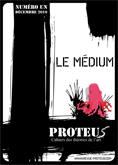Être vues
Abstract
 Télécharger l’article
Télécharger l’article
Paru dans : Proteus n°1

L’intervention de l’artiste français JR à Kibera s’inscrit dans le projet d’envergure mondiale intitulé : Women are Heroes. Son principe consistait à installer sur les toits d’immenses portraits de femmes vivant dans ce bidonville. La figuration éphémère de ces visages entiers ou fragmentés est avant tout une matérialisation d’un morceau de vie, au-delà de toute tentative de sortie de l’anonymat. Loin de l’obsolescence accélérée des images de notre société, il démontre que la taille d’un projet artistique n’est pas inversement proportionnelle à sa profondeur. L’un des objectifs de JR consiste à relier le monde des bidonvilles au monde de l’art. Cette œuvre protéiforme, impossible à délimiter dans le temps et dans l’espace, questionne avant tout notre aptitude à regarder à travers le miroir des yeux des femmes de Kibera, qui renvoient le reflet de notre propre individualisme.
Mots-clés : JR — installation — photographie — in situ — écran
French artist JR’s intervention in Kibera takes place in a worldwide project titled Women are Heroes. It consisted in installing on the roofs of a shanty town portraits of women living there. The temporary figuration of these full or partial portraits is before all a materialisation of a piece of life, beyond any attempts to leap out from anonymity. Far from the accelerated obsolescence of modern days images, it shows that the size of a project is not anti-correlated to the depths of its meaning. One of JR’s goals is to link the world of slums and that of art. This face-shifting work, which cannot be considered through time or space limitations, questions our ability to look through Kibera’s women’s eyes, which reflect as a mirror our own individualism.
Keywords : JR — installation — photography — in situ — screen








